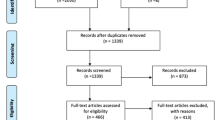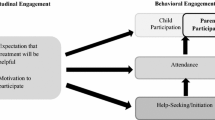Abstract
Purpose of Review
The purpose of this review was to synthesize current research about potential barriers impacting parents as they transition their college-bound youth with type 1 diabetes mellitus (T1DM) to college.
Recent Findings
Seven studies, 5 qualitative and 2 quantitative, met the qualifications for inclusion in this study by focusing on parents and were included in this review. Three potential barriers impacting the parental experience during the transition of their youth with T1DM to college were identified: developing and promoting autonomy, evolving relationships and roles in the parent/youth dyad, and distress. Parents consistently indicated concern about their youth’s ability to self-manage their T1DM and lack of support for their own transition.
Summary
This review indicates that several barriers may influence parents of adolescents with T1DM as they transition to becoming the parent of a college-bound youth with T1DM. The parental transition of launching their youth to college is more complex and unique for parents of youth with T1DM parents of youth without chronic conditions. Additional research focusing on the identification of desired supports for parents and the development of specific interventions to assist parents as they transition with their college-bound youth with T1DM is recommended.
Similar content being viewed by others
References
Papers of particular interest, published recently, have been highlighted as:•• Of major importance
United Nations. Youth - definition | United Nations Educational, Scientific and Cultural Organization [internet]. 2017 [cited 2019 Mar 27]. Available from: http://www.unesco.org/new/en/social-and-human-sciences/themes/youth/youth-definition
American Psychological Association. Guidelines for psychological practice with older adults. Am Psychol [Internet]. 2014 [cited 2019 Mar 27];69(1):34–65. Available from: https://psycnet.apa.org/fulltext/2014-01475-001.pdf
McGoldrick M, Preto N, Carter B. In: McGoldrick M, Preto N, Carter B, editors. The expanding family life cycle: individual, family, and societal perspectives. 5th ed. Upper Saddle River: Pearson; 2016.
Geller LL, Greenberg M, Acsw L. Social work in mental health managing the transition process from high school to college and beyond: challenges for individuals, families, and society. Ment Health (Lond) [Internet]. 2009 [cited 2019 Mar 27];8(1):92–116. Available from: https://www.tandfonline.com/action/journalInformation?journalCode=wsmh20
Karp DA, Holmstrom LL, Gray PS. Of roots and wings: letting go of the college-bound child. Source Symb Interact [Internet]. 2004 [cited 2018 Sep 13];27(3):357–82. Available from: https://www-jstor-org.udel.idm.oclc.org/stable/pdf/10.1525/si.2004.27.3.357.pdf?refreqid=excelsior%3Abda2690fd03db5a753567d86ada5a293
Kloep M, Hendry LB. Letting go or holding on? Parents’ perceptions of their relationships with their children during emerging adulthood. Br J Dev Psychol. 2010;28(4):817–34.
Institute of Mental Health N. 5 things you should know about stress [Internet]. [cited 2019 Mar 27]. Available from: www.nimh.nih.gov/findhelp.
Palladino DK, Helgeson VS, Reynolds KA, Becker DJ, Siminerio LM, Escobar O. Emerging adults with type 1 diabetes: a comparison to peers without diabetes. J Pediatr Psychol. 2013;38(5):506–17.
Hanna KM, Dashiff CJ, Stump TE, Weaver MT. Parent-adolescent dyads: association of parental autonomy support and parent-adolescent shared diabetes care responsibility. Child Care Health Dev. 2013;39(5):695–702.
Agarwal S, Garvey KC, Raymond JK, Schutta MH. Perspectives on care for young adults with type 1 diabetes transitioning from pediatric to adult health systems: a national survey of pediatric endocrinologists. Pediatr Diabetes [Internet] 2017 Nov 1 [cited 2018 Sep 9];18(7):524–531. Available from: https://doi.org/10.1111/pedi.12436
Lotstein DS, Seid M, Klingensmith G, Case D, Lawrence JM, Pihoker C, Dabelea D, Mayer-Davis EJ, Gilliam LK, Corathers S, Imperatore G, Dolan L, Anderson A, Bell RA, Waitzfelder B, for the SEARCH for Diabetes in Youth Study Group Transition from pediatric to adult care for youth diagnosed with type 1 diabetes in adolescence. Pediatrics [Internet]. 2013 Mar 25; Available from: http://pediatrics.aappublications.org/content/early/2013/03/18/peds.2012-1450.abstract, 131, e1062, e1070
Majumder E, Cogen FR, Monaghan M. Self-management strategies in emerging adults with type 1 diabetes. J Pediatr Heal Care. 2017;31(1):29–36.
American Diabetes Association. Children and adolescents: standards of medical care in diabetes—2018. Diabetes Care [Internet]. 2018 [cited 2019 Mar 27];41(Supp 1):S126–36. Available from: https://doi.org/10.2337/dc18-S012
Berg CA, Wiebe DJ, Lee Tracy E, Kelly CS, Mello D, Turner SL, Butner JE, Munion AK, Mansfield JH, White PC, Murray M, Suchy Y Parental involvement and executive function in emerging adults with type 1 diabetes. J Pediatr Psychol [Internet]. 2019 May 16 [cited 2019 May 21]; Available from: https://academic.oup.com/jpepsy/advance-article/doi/10.1093/jpepsy/jsz025/5490296
Saylor J, Calamaro C. Transitioning young adults with type 1 diabetes to campus life. J Nurse Pract [Internet]. 2016;12(1):41–46. Available from: http://linkinghub.elsevier.com/retrieve/pii/S155541551500940X
Smart CE, Annan F, Bruno LPC, Higgins LA, Acerini CL. Nutritional management in children and adolescents with diabetes. Pediatr Diabetes 2014;15(SUPPL.20):135–153.
Balfe M. Alcohol, diabetes and the student body. Heal Risk Soc. 2007;9(3):241–57.
Helgeson VS, Reynolds KA, Becker D, Escobar O, Siminerio L. Relations of behavioral autonomy to health outcomes among emerging adults with and without type 1 diabetes. J Pediatr Psychol [Internet]. 2014;39(10):1126–1137. Available from: http://www.ncbi.nlm.nih.gov/pubmed/25157070
Monaghan M, Helgeson V, Deborah Wiebe. Type 1 diabetes in young adulthood. Curr Diabetes Rev [Internet]. 2015;11:239–250. Available from: http://www.ncbi.nlm.nih.gov/pmc/articles/PMC4526384/
Akre C, Suris J-C. From controlling to letting go: what are the psychosocial needs of parents of adolescents with a chronic illness? [cited 2018 Sep 14]; Available from: https://academic.oup.com/her/article-abstract/29/5/764/2829546
Ness MM, Jennifer Saylor N, Janice Selekman A. Maternal experiences of transitioning their emerging adult with type 1 diabetes to college. 2018 [cited 2018 Sep 7];44(2). Available from: http://journals.sagepub.com.udel.idm.oclc.org/doi/pdf/10.1177/0145721718759980
Schultz AT, Smaldone A. Components of interventions that improve transitions to adult care for adolescents with type 1 diabetes. J Adolesc Health. 2017;60:133–46.
Whittemore R, Knafl K. Whittemore_Knafl_05.Pdf. J Adv Nurs. 2005;52(2):546–53.
Lockwood C, Munn Z, Porritt K. Qualitative research synthesis. Int J Evid Based Healthc. 2015;13(3):179–87.
Moola S, Munn Z, Tufanaru C, Aromataris E, Sears K, Sfetcu R, Currie M, Qureshi RMP, Lisy KMP-F. Checklist for case series critical appraisal checklist for case series 2 [Internet]. 2017 [cited 2019 Mar 27]. Available from: http://joannabriggs.org/research/critical-appraisal-tools.htmlwww.joannabriggs.org
Vaismoradi M, Turunen H, Bondas T. Content analysis and thematic analysis: implications for conducting a qualitative descriptive study. Nurs Health Sci. 2013;15(3):398–405.
Moher D, Shamseer L, Clarke M, Ghersi D, Liberatî A, Petticrew M, et al. Preferred reporting items for systematic review and meta-analysis protocols (PRISMA-P) 2015 statement [Internet]. 2015 [cited 2019 Mar 27]. Available from: http://www.crd.york.ac.uk/prospero.
Castensøe-Seidenfaden P, Teilmann G, Kensing F, Hommel E, Olsen BS, Husted GR. Isolated thoughts and feelings and unsolved concerns: adolescents’ and parents’ perspectives on living with type 1 diabetes – a qualitative study using visual storytelling. J Clin Nurs. 2017;26(19–20):3018–30.
Walsh A, Donnell O, Hara O. The perceptions of patients, their parents and healthcare providers on the transition of young adults with type 1 diabetes to adult services in the West of Ireland. Item type article [Internet]. [cited 2019 Feb 19]. Available from: http://hdl.handle.net/10147/623430Findthisandsimilarworksat, http://www.lenus.ie/hse
•• Law GU, Walsh J, Queralt V, Nouwen A. Adolescent and parent diabetes distress in type 1 diabetes: the role of self-efficacy, perceived consequences, family responsibility and adolescent-parent discrepancies. J Psychosom Res [Internet]. 2013 [cited 2018 Sep 9];74:334–9. Available from: https://doi.org/10.1016/j.jpsychores.2012.12.009. Findings from this study indicate that perceptions of family responsibility for self-care tasks and parental confidence in youth T1DM self-management have implications for parental diabetes distress.
•• Sullivan-Bolyai S, Bova C, Johnson K, Cullen K, Jaffarian C, Quinn D, et al. Engaging teens and parents in collaborative practice. Diabetes Educ. 2014. Findings from this study indicate that gaining the perspectives of youth with T1Dm and their parents is critical in designing future well-received adolescent–family transition clinics.
•• Ersig AL, Tsalikian E, Coffey J, Williams JK. Stressors in teens with type 1 diabetes and their parents: immediate and long-term implications for transition to self-management. 2016 [cited 2018 Sep 9]; Available from: https://doi.org/10.1016/j.pedn.2015.12.012. Findings from this study indicate that youth with T1DM and their parents understand that independent teen self-management is a major component of the transition to adulthood, but worry about teen self-management outcomes.
Hessler D, Fisher L, Polonsky W, Johnson N. Understanding the areas and correlates of diabetes-related distress in parents of teens with type 1 diabetes. J Pediatr Psychol. 2016;41(7):750–8.
Author information
Authors and Affiliations
Corresponding author
Ethics declarations
Conflict of Interest
The authors declare that they have no conflict of interest.
Human and Animal Rights and Informed Consent
This article does not contain any studies with human or animal subjects performed by any of the authors.
Additional information
Publisher’s Note
Springer Nature remains neutral with regard to jurisdictional claims in published maps and institutional affiliations.
This article is part of the Topical Collection on Psychosocial Aspects
Rights and permissions
About this article
Cite this article
Ness, M.M., Saylor, J. & Selekman, J. Barriers and Facilitators Influencing Parental Transition of College-Bound Youth with Type 1 Diabetes Mellitus: An Integrative Review. Curr Diab Rep 19, 57 (2019). https://doi.org/10.1007/s11892-019-1179-5
Published:
DOI: https://doi.org/10.1007/s11892-019-1179-5




